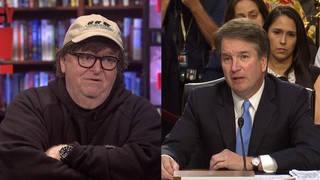
Topics
Fifty million Americans are without health insurance, and 25 million are “underinsured.” Millions being laid off will soon be added to those rolls. Medical bills cause more than half of personal bankruptcies in the U.S. Desperate for care, the under- and uninsured flock to emergency rooms, often dealing with problems that could have been prevented.
The U.S. auto giants are collapsing in part due to extraordinary health-care expenses, while they are competing with companies in countries that provide universal health care. Economist Dean Baker calculated how General Motors would fare if its health-care costs were the same as costs in Canada: “GM would have had higher profits, making no other changes … that would equal $22 billion over the course of the last decade. They wouldn’t have to be running to the government for help.” GM is sometimes referred to as a health-care company that makes cars. Former Chrysler Chairman Lee Iacocca said in 2005, “It is a well-known fact that the U.S. automobile industry spends more per car on health care than on steel.” He supports national health care.
Barack Obama said in a 2007 speech that “affordable, universal health care for every single American must not be a question of whether, it must be a question of how. … Every four years, health-care plans are offered up in campaigns with great fanfare and promise. But once those campaigns end, the plans collapse under the weight of Washington politics.”
Franklin Delano Roosevelt, in his March 1933 inaugural address, famously declared: “We have nothing to fear but fear itself. … This nation asks for action, and action now.” Deep in the Great Depression, a flurry of ambitious policies followed, detailed by New York Times editorial writer Adam Cohen in his new book, “Nothing to Fear.” He writes that FDR developed the New Deal with key, visionary advisers and Cabinet members who enacted bold policies, among them Frances Perkins, the United States’ first woman Cabinet member. Perkins, FDR’s secretary of labor, pushed for a rapid, national relief program that formed the basis of the welfare system, and for regulations on the minimum wage and maximum hours and a ban on child labor.
But she failed to achieve universal health care. Cohen told me: “She really was the conscience of the New Deal in many ways … she chaired the Social Security committee. And she wanted it to go further … to include national health insurance, but the AMA [American Medical Association], even back then, was very strong and opposed it. And she and a couple other progressives on the committee said, you know, ‘We better just settle for what we can get.’ They didn’t want to lose the whole Social Security program.”
Obama appointed former Sen. Tom Daschle as secretary of health and human services, and director of the new White House Office of Health Reform. Daschle’s health-care book, “Critical,” recalls historical failures to achieve universal care:
“Like Clinton, Truman had reason to be confident. His fellow Democrats controlled both houses of Congress, and polls showed that Americans were anxious about the high cost of health care and eager for change. But both presidents underestimated the strength of the forces arrayed against them … [s]pecial-interest lobbyists—led by doctors in Truman’s time, and insurance companies in Clinton’s.”
Obama knows the issue well—while his mother lay dying of cancer, she still had to battle the insurance industry. He said in that 2007 speech, “Plans that tinker and halfway measures now belong to yesterday. … [W]e can’t afford another disappointing charade. … [W]e need to look at … how much of our health-care spending is going toward the record-breaking profits earned by the drug and health-care industry.”
Yet Daschle proposes not much more than tinkering—improving Medicare, Medicaid and the Veterans Health Administration, all examples of “single-payer health care” in which the government is the single payer for the health care—while preserving the inefficient, multipayer, for-profit insurance model. In December 2007, the American College of Physicians compared U.S. health care with other countries’, writing, “Single-payer systems generally have the advantage of being more equitable, with lower administrative costs than systems using private health insurance, lower per capita health care expenditures, high levels of consumer and patient satisfaction.”
Michael Moore, in his film “SiCKO,” includes a recording of John Ehrlichman speaking to Richard Nixon, discussing medical-insurance profits: “… the less care they give ’em [patients], the more money they [the insurance companies] make.” Obama is in charge now. Whom will he emulate—Nixon or FDR? People across the political and economic spectrum, from big business to the little guy, are dying to know.










